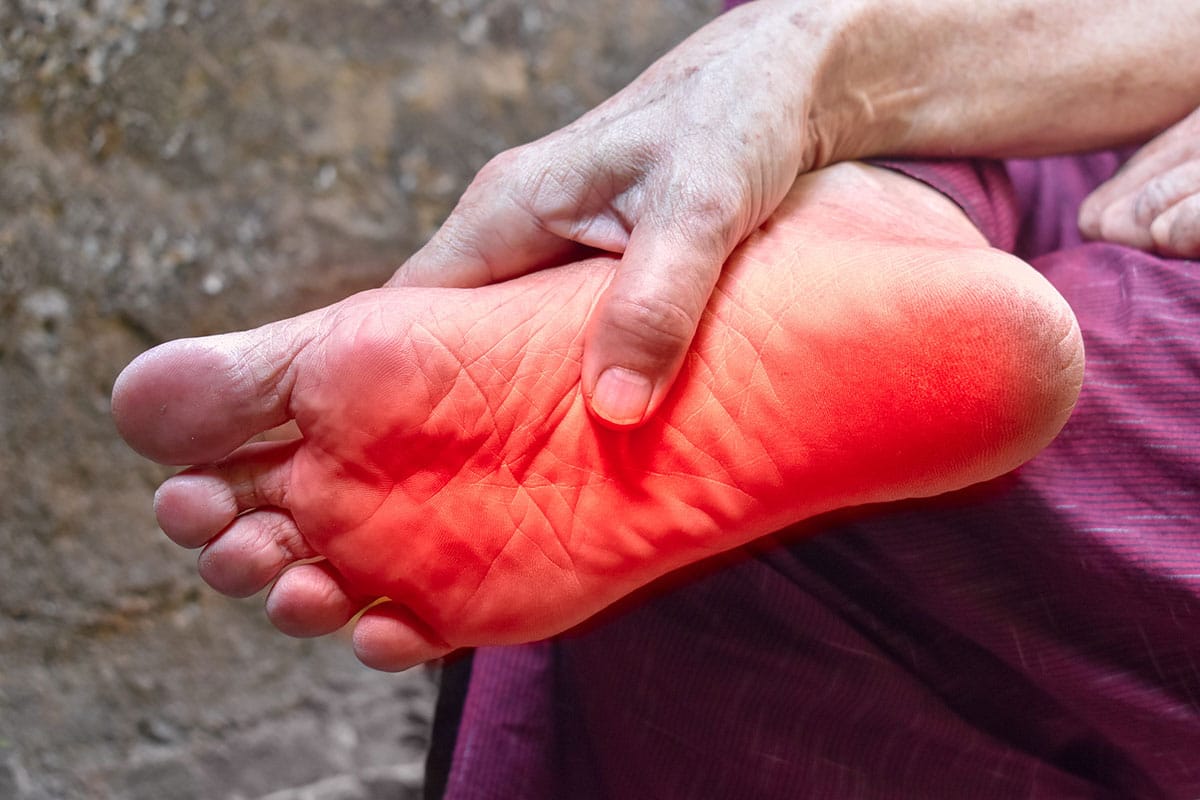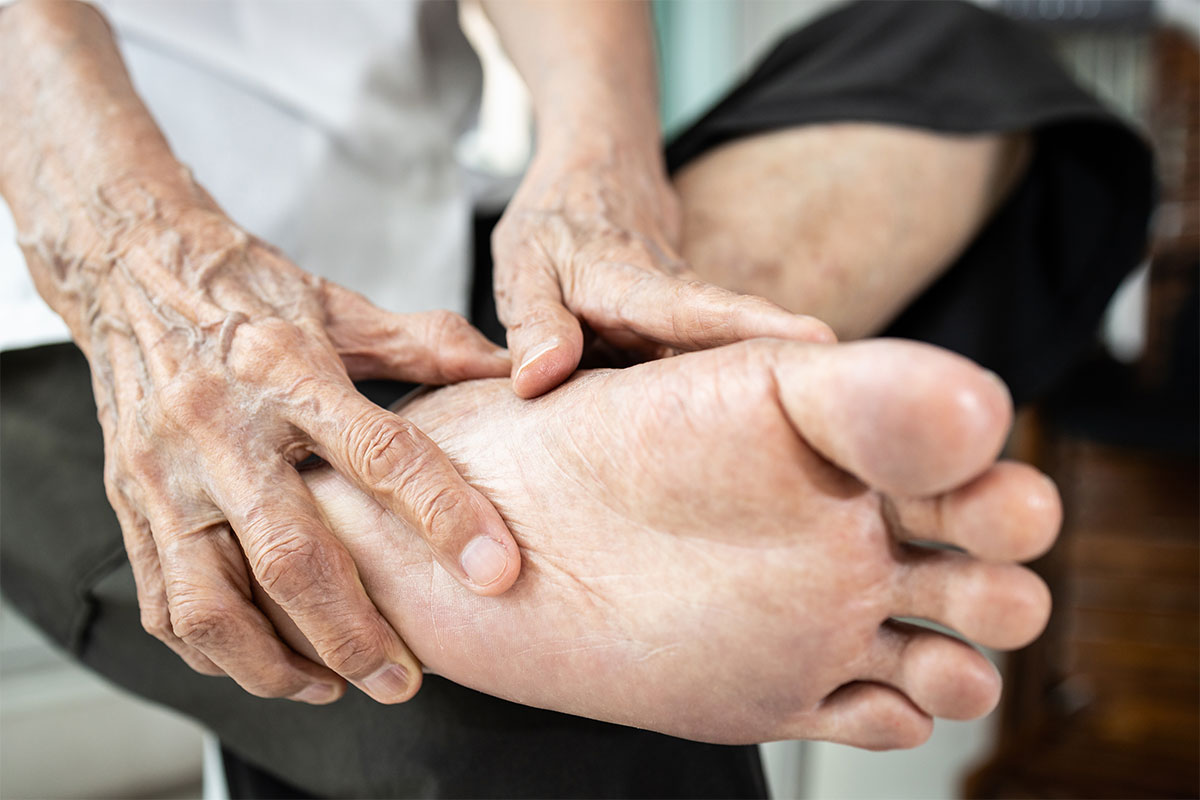What Exactly is Neuropathy?
Neuropathy refers to a situation where the peripheral nerves, which are the messengers between your brain, spinal cord, and the rest of your body, aren't functioning properly due to damage or disease. These nerves play crucial roles in letting you feel sensations like warmth, chill, and discomfort. They're also vital for muscle movement and running automatic processes in your body like heartbeat and digestion without your conscious control.

Why Does Neuropathy Happen?
There are various reasons why someone might experience neuropathy. Let's explore some of the common ones:
Diabetes-Related Damage
A significant cause of neuropathy is diabetes, particularly when blood sugar levels remain high over a long period. This condition can harm the nerves, leading to diabetic neuropathy, making it a frequent trigger for this kind of nerve damage.
Autoimmune Disorders
In some cases, the body’s immune system mistakenly attacks its own cells, including nerve tissues. This can lead to neuropathy. Diseases like rheumatoid arthritis, lupus, and Guillain-Barré syndrome fall into this category, where the immune system’s misdirected attack on nerves results in pain and dysfunction.
Vitamin Deficiencies
Your nerves need certain vitamins to function correctly. Lacking vitamins such as B1 (thiamine), B6, B12, and vitamin E can lead to nerve damage over time. These deficiencies highlight the importance of a balanced diet for nerve health.
Physical Injuries
Nerves can be damaged by physical trauma, such as from accidents, falls, or repetitive movements that stress certain parts of the body. This type of injury can lead to neuropathy in the affected area, causing pain and loss of function.
Infections
Some viruses and bacteria are known to attack nerve tissues directly or cause conditions that lead to nerve damage, such as Lyme disease, HIV, and hepatitis C. These infections can initiate or exacerbate neuropathy.
Genetic Factors
In certain families, neuropathy is a hereditary condition, passed from one generation to the next. Conditions like Charcot-Marie-Tooth disease are genetic forms of neuropathy affecting peripheral nerves.
Exposure to Toxins
Coming into contact with toxic substances, whether environmental toxins, certain chemicals, or specific medications, can also damage the nerves, leading to neuropathy.
Understanding the diverse causes of neuropathy underscores the importance of a healthy lifestyle, regular medical check-ups, and addressing any underlying health issues promptly. Recognizing the symptoms early and consulting with healthcare providers can lead to better management of the condition and improve quality of life for those affected.
Understanding Different Types of Nerve Pain (Neuropathy) and How They Affect You
A Closer Look at Neuropathy Types and Their Symptoms:
Nerve Pain in Your Arms and Legs (Peripheral Neuropathy)
- This is the most common kind of neuropathy. It happens when the nerves that send messages of touch and movement between your brain, spinal cord, and your arms, legs, and feet aren’t working right.
- You might feel numb, or like you have pins and needles, or even a burning pain in your hands and feet, or up and down your legs. Cramping and soreness can be common. Some people even experience electric shooting pains.
- Over time, you might find your muscles getting weaker, making it harder to do things that need careful movements, like buttoning clothes or picking up small objects. Walking might become difficult without some help.
- If it gets worse, you could have trouble feeling things like heat or sharp objects, which means you might not notice if you get burned or cut. Balance problems are often a sign of Neuropathy in the feet of many individuals.
Nerve Pain That Controls Automatic Body Functions (Autonomic Neuropathy)
- This type affects the nerves that handle things in your body that happen without you thinking, like your heartbeat, digestion, and controlling when you go to the bathroom.
- If these nerves are damaged, you might feel dizzy when you stand up quickly, have trouble with your stomach like constipation or feeling full quickly, or find it hard to control your bladder. It might also affect your sex life.
- You could also have trouble with sweating too much or not enough, making it hard to stay comfortable in hot weather or when exercising.
Nerve Pain in a Specific Area (Focal Neuropathy)
- Sometimes, the damage is just to one nerve or a group of nerves in one area. This can cause pain or weakness right where the problem is.
- For example, carpal tunnel syndrome affects the wrist and can make your hand feel numb or weak. Bell’s palsy affects your face and can make one side of your face droop or become stiff.
- You might suddenly feel a sharp pain or find that some muscles don’t seem to be working right, depending on which nerve is affected.
Nerve Pain from Nerves Being Squeezed (Compression Neuropathy)
- This happens when a nerve is pinched, which can be due to getting hurt, doing the same action over and over, or because of the way your body is built.
- Like with carpal tunnel syndrome, which makes your wrist hurt and hand weak, or sciatica, which can cause pain that runs from your lower back down your leg.
- The pain can spread out from the spot where the nerve is pinched, and you might also feel numbness or that your muscles are weaker.
Recognizing the Signs of Neuropathy
The symptoms of neuropathy can widely differ, shaped by the specific nerves impacted and the root cause of the condition. Frequent symptoms include:
- A sensation of numbness, tingling, or prickling, often beginning in the hands or feet and possibly spreading to other parts of the body.
- Muscle strength may decrease, or in severe cases, paralysis might occur.
- Difficulties with coordination and maintaining balance, affecting daily activities.
- Experiencing sharp, burning pains or sudden, intense bouts of pain.
- An increased sensitivity to touch, where even light contact can be uncomfortable.
- For neuropathy affecting the body's automatic functions, digestive issues or problems with bladder control may arise.


Advanced And Best Treatment Options For Peripheral Neuropathy
At Sarasota Diabetes & Neuropathy Center, our commitment is to offer more than just temporary relief for those suffering from Peripheral Neuropathy. We understand the profound impact this condition can have on daily life, and our mission is to address it at its source. Our unique approach focuses on identifying and treating the root cause of our patients’ peripheral neuropathy, moving beyond the conventional strategy of simply managing symptoms like high blood sugar levels.
When we determine that a patient is a good candidate for treatment, they will embark on a comprehensive journey toward healing. The process begins with an in-depth evaluation, utilizing a variety of laboratory tests and analyses to pinpoint the specific factors contributing to each individual’s peripheral neuropathy. Under the careful guidance of our dedicated medical professionals, each patient receives a customized treatment plan. This plan may include specialized supplementation and other interventions aimed directly at addressing the underlying causes of their condition.
Our proactive and personalized methodology is central to our philosophy. At Sarasota Diabetes & Neuropathy Center, we don’t just aim to manage the symptoms of Peripheral Neuropathy; we strive to improve our patients’ overall health and enhance their quality of life. Through our targeted approach, we’ve seen significant success in reducing our patients’ dependence on medications and helping them return to a life not dictated by neuropathic pain.